- > Top Page
- > About JASRAC
- > JASRAC Music Culture Award
- > “The Second JASRAC Music Culture Award”
“The Second JASRAC Music Culture Award”
JASRAC Music Culture Award was established in November 2014 to provide encouragement for future endeavor, by shedding light on individuals, organizations and works in various fields contributing to music culture development through unheralded activities that may not lead to impressive statistics in sales and works usage.
The second award was presented to the following individual and groups by Mitsuo Sugawara, President of JASRAC, in the award ceremony held at Keyaki Hall (Shibuya, Tokyo) on November 18, 2015. The awardees were presented with plaques and sub-prizes.
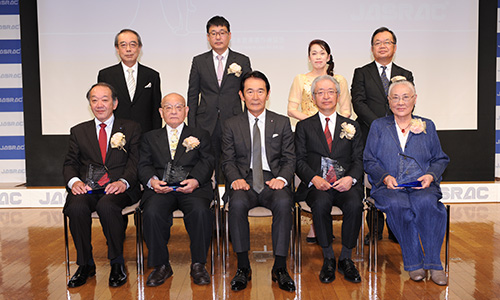
Gyouji Osada
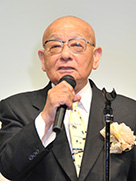
Reason behind his receiving the award
Gyouji Osada has systematically researched the history of popular music of Japan, including pop songs, children's songs, traditional folk songs and military songs, from his unique perspective for more than three decades, and actively published the results of his studies. Marking the 70th anniversary of the end of WWII this year, he published a book entitled "Sensouga nokoshita uta~Utaga akasu sensouno haikei~ (*Songs the War Left Behind – songs that shed light on the backdrop of war)" in which he questions "war" and "peace" from the perspective of "song." He also put a number of works that have historical value out into the world and passed the history of the songs of Japan down through the generations.
Comment from the awardee
In my works which research popular music, I had been careful not to use technical terms as much as possible. Receiving this award will serve as impetus for me to accomplish many things with a view to give back to society what I have learned from many people.
Profile of the awardee
Gyouji Osada was born in 1930. After graduating from university, he worked at a record company as a director for many years with many great achievements as a planner and producer. Meanwhile, from around 1980, he energetically started his writing career as a music culture researcher. He has published more than 200 books, including "Ryuukouka 20 seiki (*20th Century Pop-Songs)", "Nihonminyoujiten (*Encyclopedia of Japanese Traditional Folk Songs)," etc. This June he published the aforementioned 800-page book "Songs the War Left Behind…" which widely chronicled Japanese songs and the historical background during and after the Meiji period.
Kiso Music Festival Executive Committee
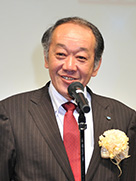
Toyomi Murakami
Secretary General
Reason behind its receiving the award
In the mountain region where there are few chances to enjoy live music, people who genuinely love music have worked together for over 40 years to invite performers to their hand-made music festival. Steady efforts by the town of Kiso and its residents as a whole have allowed music to take deep root in the local community. It represents an effective model in developing a high-quality culture in rural areas.
Comment from the awardee (Toyomi Murakami, Secretary General)
Kiso Music Festival, supported by many performers and volunteers, has become one of the longest running music festivals in Japan. I think that music is the lingua franca of the world. The town of Kiso will continue to strive. We thank you for your continued support.
Profile of the awardee
The Kiso Music Festival began as a regularly held concert produced voluntarily by local classical music lovers in 1975, and has grown to be an annual event held in the mountain town of Kiso, with the support of volunteers. Overcoming financial difficulties, the executive committee was established in 1986, and an operating structure consisting of town authorities, residents and performers was developed. It was initially held in a gym, but moved to the Kiso Culture Park Culture Hall when it was built in 1990. Works that are seldom performed and premiers have often been included in the program, and the quality of the performances are highly regarded. Interaction between performers and residents during the festival period is also popular among the performers.
Nagasaki Opera Association and OMURA Chamber Orchestra (Original Opera "Inochi")
Reason behind their receiving the award
Orchestral music and opera are not cultural activities that take root overnight, and it is said that to continue such activities in rural areas requires even more resolve. Both groups have overcome various obstacles to continue their activities, which have come to fruition with the Tokyo premier of "Inochi (*Life)," an original opera depicting radiation exposure in the aftermath of the atomic bomb that was dropped in Nagasaki, where the groups are based. This year, marking the 70th anniversary of the end of WWII, the national attention garnered by the two groups from Nagasaki regarding the importance of nurturing culture in rural areas is particularly significant.
Nagasaki Opera Association
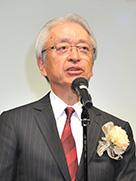
Yoshiki Ueda
President
Comment from the awardee (Yoshiki Ueda, President)
It is an absolute thrill for our members who are engaged in music activities for our hometown, to be afforded the chance to perform in Tokyo, and then to also receive such an award.
Profile of the awardee
The Nagasaki Opera Association was establish in 1980 by the late Mutsumu Shibata, one of the leading singers in the Showa period. Through its activities, it has aimed to establish a rich music culture in Nagasaki, where the first opera performance in Japan took place. It is active in contributing to the community and reaching out to teachers and schools as well.
OMURA Chamber Orchestra
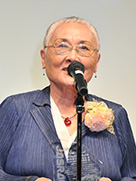
Sumiko Murashima
Artistic Director
Comment from the awardee (Sumiko Murashima, Artistic Director)
We established the orchestra because we wanted children to have the opportunity to listen to good live music, and the passion of the orchestra members brought us this far. I would like to raise a toast with all of our members.
Profile of the awardee
The OMURA Chamber Orchestra is a professional chamber orchestra based in the city of Omura in Nagasaki Prefecture. Sumiko Murashima gathered performers from within the prefecture and established the orchestra in 2004. Its first performance in Tokyo this May was a great success.
*Unofficial translations.
